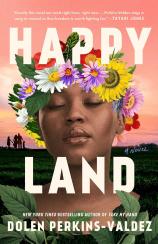Happy Land
Review
Happy Land
Award-winning author Dolen Perkins-Valdez has established herself as a preeminent chronicler of America’s history, particularly its little-known, understudied and, frankly, shameful dark corners. In HAPPY LAND, she combines her meticulous research and deep emotional resonance to explore the “intentional communities” built by formerly enslaved people as they adjusted to free life.
Nikki Lovejoy-Berry is almost 40 years old, but she is only visiting her grandmother, Mother Rita, for the first time. Mother Rita and Nikki’s mother have been more or less estranged for decades, but ever since the death of Nikki’s father and the blowout argument they had after the funeral, they’ve been decidedly “off.” Nikki hates to think of her grandmother alone in a small rural community, but with her own life to live --- she’s single, her real estate career has yet to take off, and her aimless daughter has no goals --- who has time to settle the arguments of other adults? Still, when Mother Rita calls Nikki and tells her that she needs her --- and that if she comes to help, she will learn everything she never knew about their family --- the offer is too good to pass up.
Upon arriving in Hendersonville, Nikki is surprised by more than a few things. First, her family has their own road named after them, Lovejoy Lane. Second, age has nothing on fiery Mother Rita, who still works her own gardens and sells her flowers at the market every week. And third, Nikki’s grandmother seems to have no intention of telling Nikki why she was summoned and why she refuses to talk to her own daughter. Rather than speaking of the present, Mother Rita tells Nikki that she is descended from royalty, namely Queen Luella, a formerly enslaved woman who helped put down roots on the very land where she resides today.
"Replete with rich historical detail, complex, flawed characters who leap off the page, and a generations-old mystery, HAPPY LAND is what all works of historical fiction should dream of being."
The descendant of a long line of high school graduates with no generational wealth, Nikki is quick to laugh off her grandmother’s claims of royalty, but the woman is adamant. Not only was her ancestor royalty, she was one of the primary founders of the Kingdom of the Happy Land, an intentional community built by former slaves desperate to make freedom their own and build wealth and community away from the eyes of the law and the Klan (often the same people). Mother Rita says that the truth about everything, including the rift between her and Nikki’s mother, lies with Luella. Now all Nikki has to do is uncover more than a century of history --- most of it passed down through stories and largely unrecorded --- to learn the truth about this storied “kingdom” and help her mother and grandmother see eye-to-eye again. And she has only a week to do it.
Fortunately for readers, Perkins-Valdez does not make us wait to meet Luella, alternating between her perspective and Nikki’s as both women edge closer to the kingdom. In the 1870s, a young Luella watches as her father, a preacher, starts to build up the community of freed men and women, encouraging them to vote and make their voices heard. The South may have begrudgingly granted Black men and women their freedom, but the Klan will not allow them to vote, no matter what the law says.
Luella’s father determines that they must leave and build a new home of their own. Two young congregants from his church, William and Robert Montgomery, say they have a lead on land 60 miles north in the Blue Ridge Mountains. There, they will rent land from a widowed innkeeper with far too much land to manage, work to earn money, and erect a kingdom, just as their African ancestors did. They no longer will be just slaves or even former slaves, but land-owning men and women, workers who earn, save and contribute to generational wealth for their kingdom. And at the heart will be a king and queen: William and his new bride, Luella.
Unlike Nikki, a skeptic, the reader doesn’t need faith to believe in Happy Land. As Perkins-Valdez pens Luella’s scenes, we watch as it is erected, governed and improved, particularly as the female members take on greater leadership roles. But the thriving, mind-blowing success of Happy Land begs the question: What happened? Where once there was a community of learners, growers and healers, there is now only Mother Rita, estranged from her daughter and granddaughter. Where there were lessons and legends to be passed down, there is only hurt.
And then comes the shocking blow: Mother Rita has an urgent, terrifying reason to call upon her granddaughter. Due to a loophole known as “heirs property” --- a malicious act that has stolen millions of dollars of property from the marginalized and disenfranchised --- Mother Rita is set to lose not just her home, but also her history. Happy Land will no longer just cease to exist; it will cease to be remembered, along with Queen Luella, her reign, and her dramatic fight for her people.
Replete with rich historical detail, complex, flawed characters who leap off the page, and a generations-old mystery, HAPPY LAND is what all works of historical fiction should dream of being. I was blown away when I read TAKE MY HAND, which exposed yet another racist pocket of American history. But if that book wowed me, then this one floored me. This exploration of intentional communities seamlessly blends fact and fiction for history that feels as immersive as fiction, and fiction that feels as alive as fact. Perkins-Valdez truly brings postbellum Appalachia to life for her readers. But more than dwelling on the painful facts of post-slavery life, she demands that we feel what it was like: to choose a name for oneself and one’s children, to vote, and to own land. America, she points out, has an obsession with property.
Although it may seem silly, the characters here are quick to realize the power in ownership. But this ownership means nothing unless the story of the fight to secure it is passed down through generations. “They can’t grab on to the strength,” King William tells his bride, “if we don’t share the pain.” This line proves to be a theme of the novel, but I think it applies as a theme of Perkins-Valdez’s canon as well. Pain is strength, she proves, and no one is better at wielding it and molding it into something as gorgeously rendered as HAPPY LAND.
Reviewed by Rebecca Munro on April 18, 2025
Happy Land
- Publication Date: March 3, 2026
- Genres: Fiction, Historical Fiction, Women's Fiction
- Paperback: 384 pages
- Publisher: Berkley
- ISBN-10: 0593337743
- ISBN-13: 9780593337745




